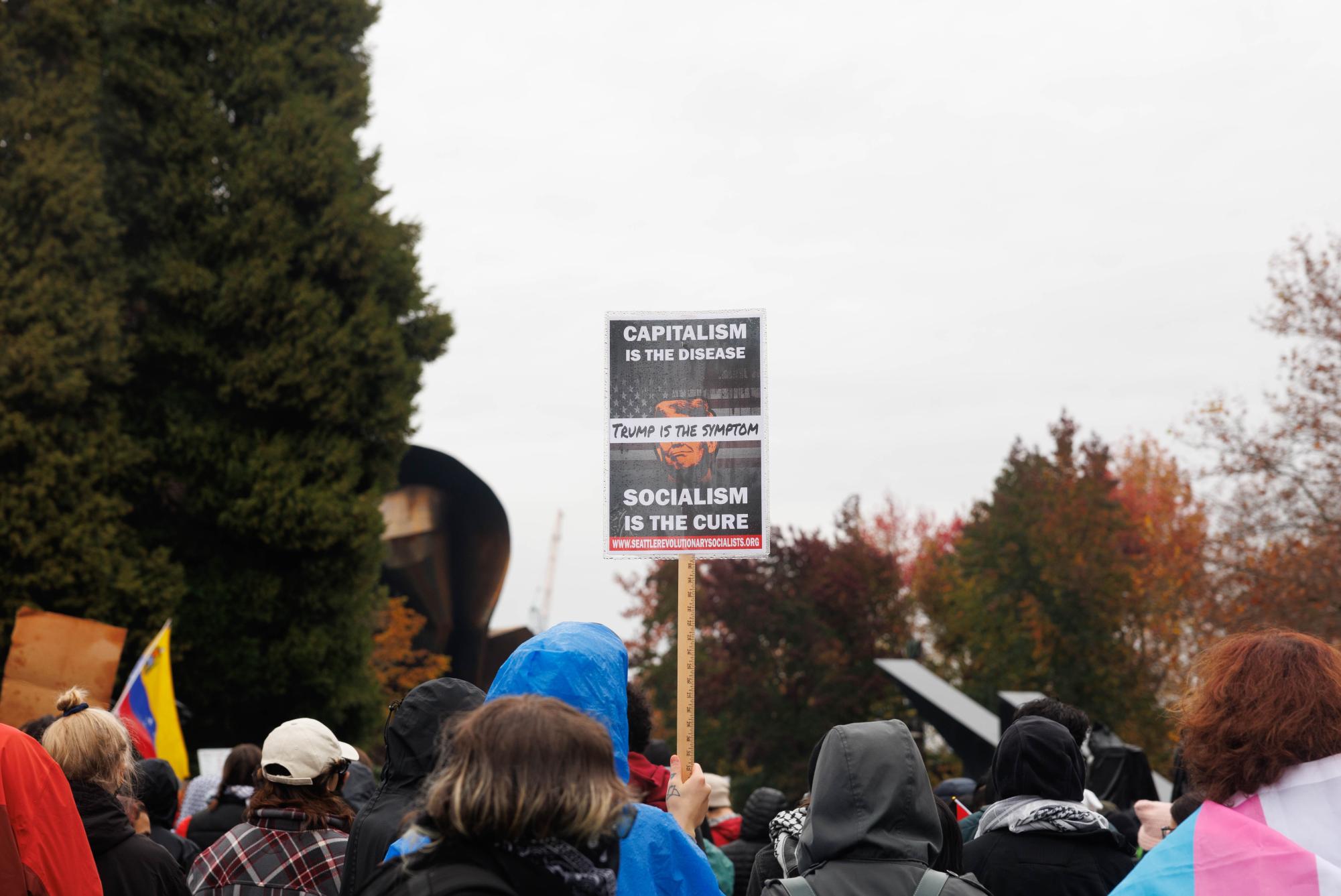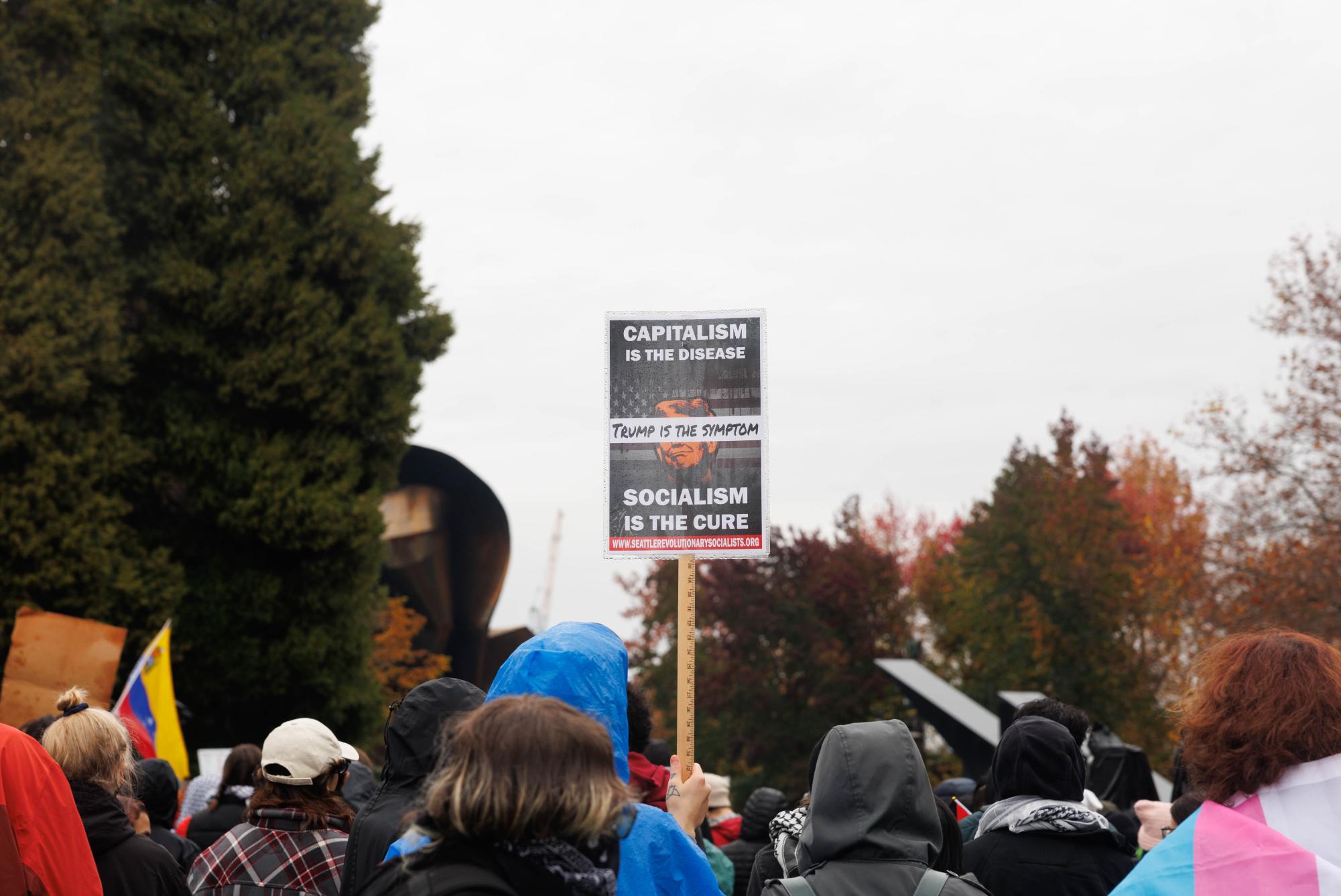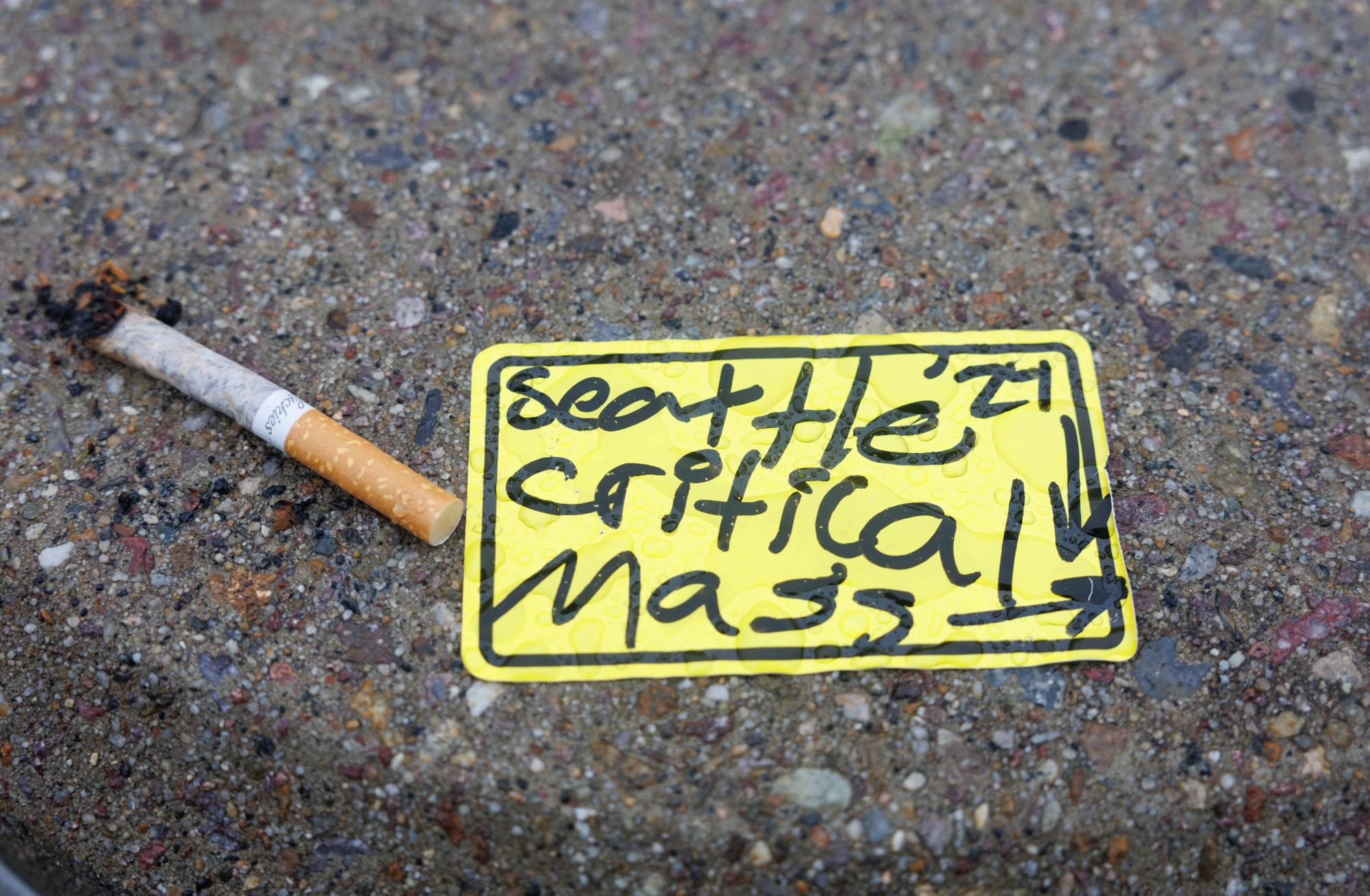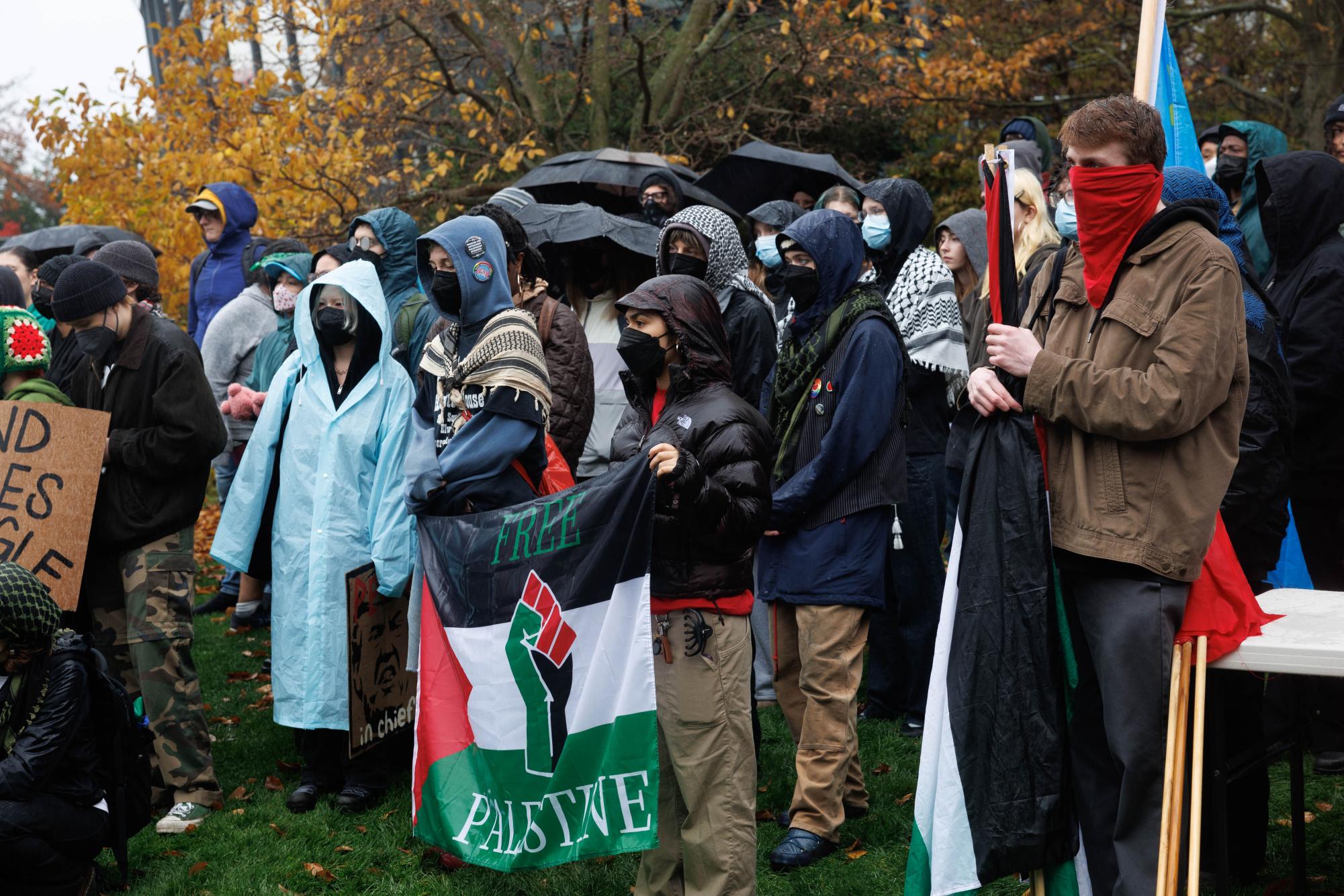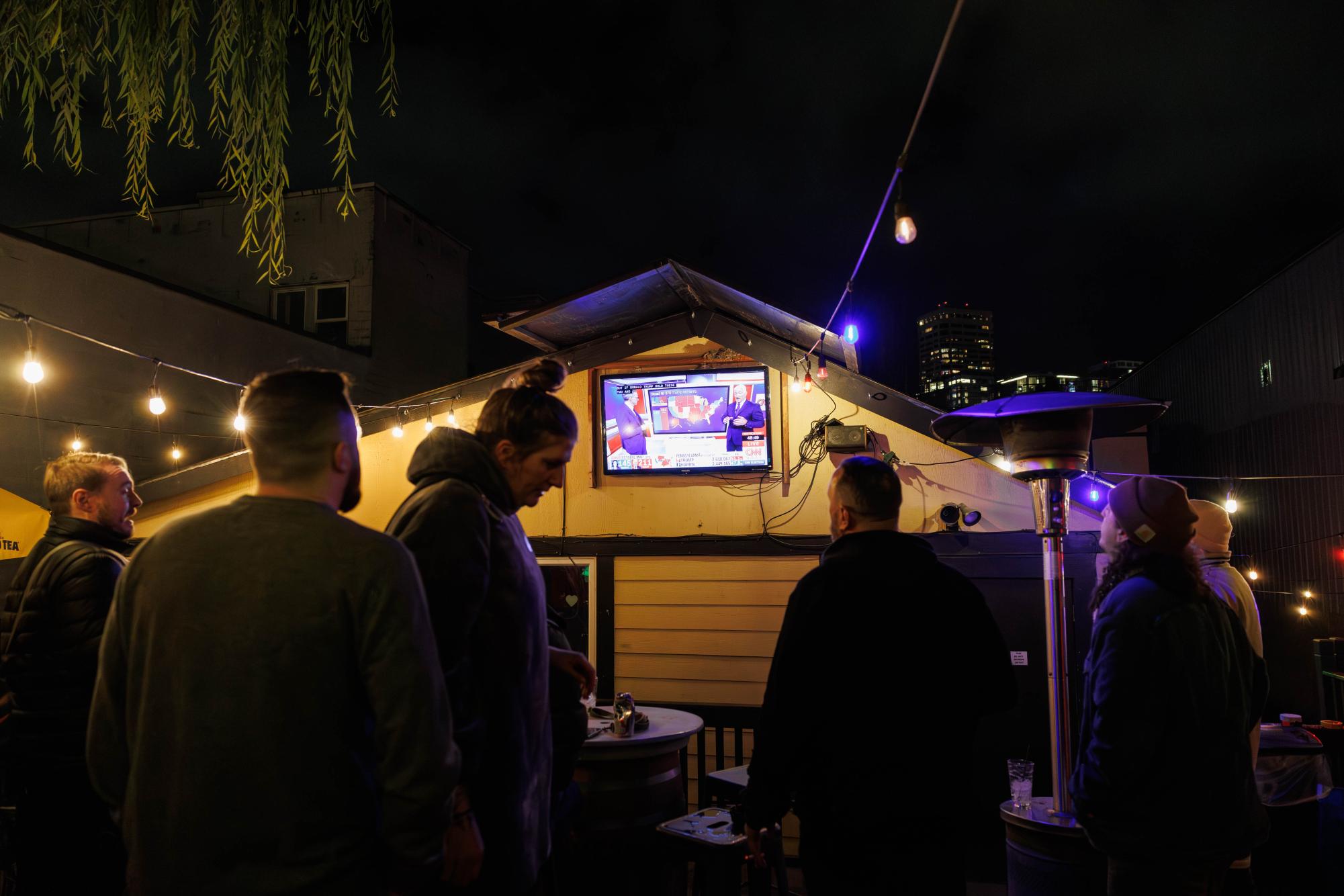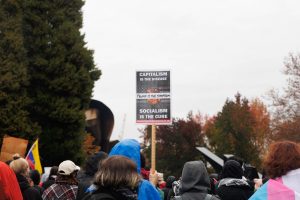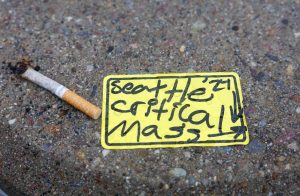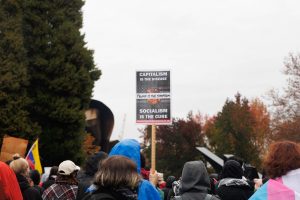It’s been over a week since the general election, but the dust is far from settled. With inauguration looming ahead, many at Seattle University, and in the greater Seattle area, are either holding their breath for what comes next or trying to forget.
President-elect Donald Trump’s re-ascendance to the highest political office in the United States—along with Republicans’ takeover of the Senate and the House—will have profound policy impacts on American politics for far longer than the next four years. Reflecting on Nov. 5, the sentence starter for a familiar American phrase comes to mind; “Where were you on election night 2024?”
Election Night in Capitol Hill
For some students, the answer was Wyckoff Auditorium, where the political science department hosted a modestly attended election night watch party. Students filed in and out of the auditorium throughout the evening, most holding a mixture of anxiety and reserved hope.
“I’ve seen people cry, so…I’m trying not to care a lot, because I don’t want to feel big emotions,” Ella Grayzel, a third-year English major, said.
Camila Torez, a second-year English major who attended the watch party, said she was feeling hopeful, but that if Trump won, she would promptly call her mom to cry and commiserate. This would be followed by a bowl of ice cream, some T.V. and her couch.
Around 7:30 p.m., the watch parties’ primary host, Associate Teaching Professor Patrick Schoettmer, interrupted CNN’s broadcast to share with students what was likely driving liberal panic across the country—The New York Times Needle. This device is a sort of temperature indicator that collects various data to give real-time predictions on election outcomes. The dial displayed Trump having a 75% chance at victory with a predicted 291 electoral votes. A hush fell throughout the room, some students started to slowly leave.
At the Chieftain, Seattle U’s long-time unofficial student bar, students were in sparse supply. However, it’s important to remember that for a majority of citizens who voted in this election, Nov. 5 was far from a somber affair. The Chieftain on Tuesday night included at least one of these excited individuals.
Tim Dillon, the self-proclaimed inventor of sports gambling and owner of multiple sports-betting and sports management businesses, was elated by the night’s results. He was excited by Trump’s proposal to slash the corporate tax rate and believed it would allow companies to hire more domestic workers. While he admitted he did not think Trump was a good person, he was willing to overlook issues of personality in favor of someone who he saw as a successful CEO and businessman.
Dillon believed Democrats failed to convince voters that they possessed the same economic prowess Trump had.
“At the end of the day, we care about prospering. We can talk about social issues all day and argue about them, but this is not about abortion, this is about the economy and lifting people up,” Dillon said. “I think the Democrats lost this because they made it about abortion, they made it about a social issue.”
This sentiment seems partially supported by early exit polling, reporting that the vast majority (68%) of Americans see the U.S. economy as doing poorly. Republicans won seventy percent of these voters. By contrast, less than half the respondents said abortion was their primary issue.
As the night began to wind down, a short walk around Capitol Hill found the usually vibrant neighborhood empty and mute, even for a Tuesday night. The pizzaiolo at Mario’s Pizza gave free slices to everyone in line as he cast dejected glances at the television, occasionally muttering to himself in disbelief. Most bars were empty by 10 p.m.
Fed Up at the Needle
Other constituencies in the Seattle area had a different perspective on why Democrats failed across the board last week. Friday, Nov. 9, several hundred demonstrators gathered at the Space Needle to protest the outcome of the U.S elections—no matter who won.
Those attending the event were certainly not friends of Trump, but Harris and the Democrats also failed to receive anything close to partisan support. Instead of citing the campaign’s messaging on abortion and other “social” policy as its greatest misstep, speakers at the event seemed to believe it was due to a failure to platform policy positions that would energize the working and middle class. This, they said, was symptomatic of a larger disease in American democracy—big money politics and the two party system.
“We reject the lies that both parties are peddling… this two party system has failed us all,” Jordan Faralan, an organizer from Anakbayan USA, said.
Liz Park, a speaker from the International League of Peoples Struggles, also addressed the demonstrators in tandem with Faralan.
“In this election, the democrats through Harris showed their true alliances; to keep the ruling class in power, and ultimately, did not have any concrete solutions for the true needs of us all!” she said.
One thing felt clear; the attitudes and ideologies spurring this protest were not the same as those that swept the nation following Trump’s first presidential win in 2016. “Love Trumps hate” has become “Dems + Reps serve Big Tech + War$.” Social protest following Trump’s re-election has been noticeably different, both in the coalitions and issues that have been centered, and the numbers they have drawn.
The Implications of a Second Trump Term
While those who attended Friday’s protest may only represent an ideological fraction of the electorate, it’s easy to see that there are voters missing from 2020, and they all haven’t just gone to the Republican party. Turnout is down across the board, even when the Harris campaign outspent Trump at every leg of the race. These findings raise questions about what comes next for those in opposition to the current administration.
One thing to immediately focus on is the policy areas Trump excelled at, and what following through on these campaign promises could mean for the Seattle U community and the wider Washington area.
There are a variety of different competing narratives attempting to explain the results of the 2024 election. Associate Professor of Political Science Onur Bakiner, the university’s newly appointed director of technology ethics initiative, identified key pieces, like anti-immigration policies, as well as a host of nationalist conservative platforms having a run of success in post-pandemic governments.
“It is hard to talk about one global trend, but anti-immigrant politics appears to be the unifying thread for the far-right in much of Europe and the United States,” Bakiner said.
During his campaign, President-elect Donald Trump proposed an overhaul of illegal immigration nationwide. Trump has defined a more concise approach this term, starting with a proposed expansion of 66,000 immigration enforcement officers alongside the introduction of a completely new deportation force that will pull from military, federal agents and state and local police from across the country.
His proposed immigration policies would mean large-scale mobilization of enforcement agencies at every level of government, the feasibility and legality of which has been questioned.
Trump has also voiced his intention to shift a large amount of resources to the integration of AI into his second term as president.
“Trump and Vance have made it clear that they will deregulate the technology sector,” Bakiner said. “The new administration may be very attentive to right-wing tech billionaires who supported Trump’s election campaign, like Elon Musk and Peter Thiel.”
Musk and other tech giants were not only important in the process of election, but are well positioned to steer future national advancements on AI rollout and the safety procedures surrounding the technology. A new petition has been gaining traction in conservative spaces calling for Musk to receive a leadership role as special advisor to the president on AI. While Musk has a somewhat respected track record on AI, there are concerns about conflicts of interest. Consistent with his leadership role at the yet to be created Department of Government Efficiency (DOGE), specifics are lacking.
Alongside these new appointments, Trump hopes to enact a number of financially impactful policies as well. One that will certainly affect students in the Seattle U community is a walkback from President Joe Biden’s student loan relief programs. Trump has repeatedly criticized the Department of Education, even vowing to cut the entire department. With the branch definitely in for a mass amount of overturn, plans to relieve students of laborious loan debts do not seem to be in the cards.
Looking at Washington State’s outcomes, just one of the five measures cast on local ballots were passed. Washington measure 2066 was approved, by a narrow 51%, banning the prohibition of natural gas in homes and various buildings. This repealed a state reform that hoped to enact a transition away from forms of natural gas to widespread utilization of electricity.
Alternative reforms, such as proposals to repeal capital gains and carbon credit taxes failed, as well as measure 2124, which aimed to allow citizens the ability to opt out of the statewide long-term healthcare plan.
Our country has already lived through one Trump presidency, but this one will be different. The response from Democrats and others on the larger left appears to be somewhat muted in the days following Nov. 5, but it remains to be seen how the beginning of Trump’s policy roll-out will affect the response. This upcoming term will bring changes that have not been experienced thus far. Tackling new nationwide focuses like AI while escalating efforts on previous policies surrounding immigration and the economy, our president-elect seems to be taking a more concerted approach to his second term.


